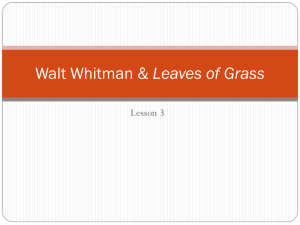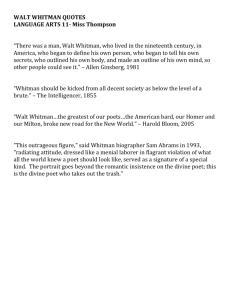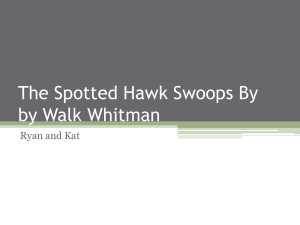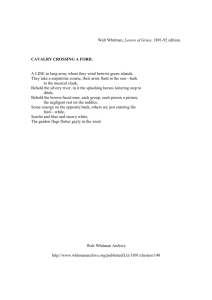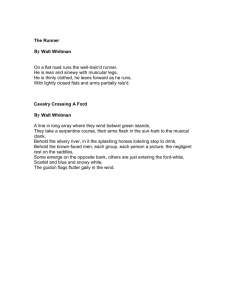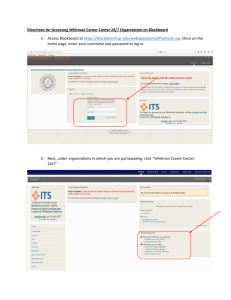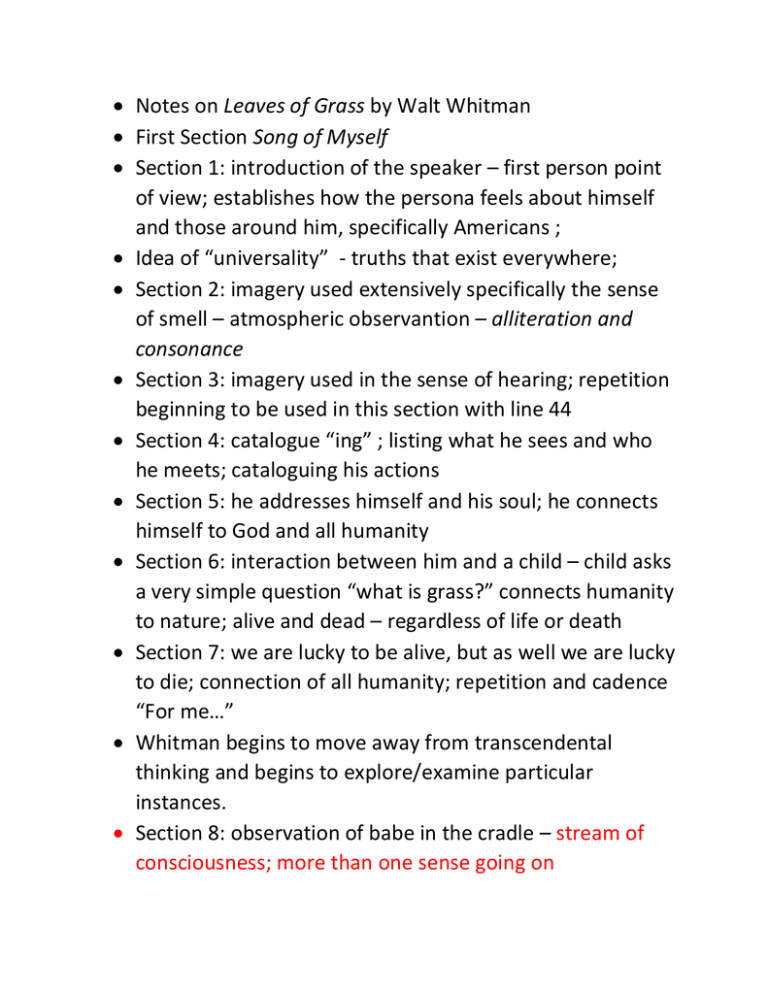
Notes on Leaves of Grass by Walt Whitman
First Section Song of Myself
Section 1: introduction of the speaker – first person point
of view; establishes how the persona feels about himself
and those around him, specifically Americans ;
Idea of “universality” - truths that exist everywhere;
Section 2: imagery used extensively specifically the sense
of smell – atmospheric observantion – alliteration and
consonance
Section 3: imagery used in the sense of hearing; repetition
beginning to be used in this section with line 44
Section 4: catalogue “ing” ; listing what he sees and who
he meets; cataloguing his actions
Section 5: he addresses himself and his soul; he connects
himself to God and all humanity
Section 6: interaction between him and a child – child asks
a very simple question “what is grass?” connects humanity
to nature; alive and dead – regardless of life or death
Section 7: we are lucky to be alive, but as well we are lucky
to die; connection of all humanity; repetition and cadence
“For me…”
Whitman begins to move away from transcendental
thinking and begins to explore/examine particular
instances.
Section 8: observation of babe in the cradle – stream of
consciousness; more than one sense going on
Section 9: barn doors – stream of consciousness; more
than one sense
Section 10: observation of man hunting; happens upon an
Indian couple getting married; slave in the woodshed
Section 11: 28 men swimming/ “bathing” 29th swimmer is
a lonesome woman 28 year-old; wealthy; longs for
companionship; the bathers are unaware – free indirect
discourse –
Song of Myself – “I’m Awesome”; section 1 Song of Myself
13 lines long:
I am fabulous, beautiful, radiant
Beyond comprehension and reason; quietly
2 lines of you are awesome
spending my days in the sun. basking away the
1-3 lines of what relaxes you
stress. Petite brunette with the latina walk,
stiletto heels. Lucy and Ricky, babalooing down
3 lines describing yourself
the hall.
1 line explaining your parents
2 lines of what you hope to do before your death
2 lines explaining that you are going to observe life and
your surroundings
I am fabulous, and you will know this, too
Because everything I say is perfection, exceptional,
Great.
Section 12
All about the jobs that people do – their crafts
Whitman specifically speaks of people who work with their
hands and are athletic; men who produce using physical
labor
Section 13
Whitman describes a black man who drives a cart –
physically strong and impressive man; he admires that the
man is in complete control of his horses.
Whitman uses the word “caress” specifically when
observing this man – he states that he “caress”es life with
his gaze and perhaps with his words; he states that he can
get more out of a gaze of an ox than he can reading words;
again Whitman emphasizes that true reading is in the
observation of nature
Section 14
Whitman describes animals in this section – he finds
meaning in everything, even a goose squawking; but he
gets frustrated about explaining simple things;
He explains being outdoors; first person point of view;
he describes “Me” as a person who does not ask for much
from anyone else
Section 15
More jobs! He describes people in relation to their
occupations and role in society; ex. “contralto” – singer;
“jour printer” – daily newspaper printer; “quadroon” –
nanny slave in New Orleans; “lunatic” – who is just as
respectable as any other job
Whitman is optimistic and naïve; he takes bad and good
the same
Everyone fits into a community and have equal status – he
never elevates one status over another; even the
president doesn’t get special treatment; but he contradicts
himself… he begins to judge people but goes out of his
way to criticize those people who judge the prostitute- he
judges only those who judge; he exclaims that he likes
everyone and they all like him.
Section 16
Whitman believes that he is strung together from a bunch
of different parts and sections
He is a compilation of a lot of opposites: old and young,
foolish and wise, mother and father, average people and
elite, south and North – written before the civil war;
Whitman sees the real danger of civil war; he mentions
American states before addressing Asia and Europe
He loves his diversity and by the end of this section he
turns idea in to nature – of, course.
Section 17
Whitman wants us to believe that all people share his
ideas, that nothing he says is really original
If we don’t take his words as our own, then we will never
believe that we are all connected;
Everything in nature is our own including the grass that we
walk on
The grass here also refers to the “leaves” in the title
Section 18 (1855)
Later editions of Song of Myself; this section is almost
entirely about war and battle images
Whitman states that all people share war, songs, water,
laws…
About war – Whitman states that the songs are for the
defeated as well as the victorious – he ignores winners and
losers
Section 19
Whitman states he would make a bad coach – ‘cause he
wouldn’t be able to cut anyone
Whitman invites everyone to enjoy time with him – slaves,
thief, people with venereal disease – STD
Fate meal – “this is…” repeated several times – Biblical
imagery of the last supper
Whitman places himself in Jesus’s place – why?
Whitman claims that he has the same purpose as nature;
He tells the reader – audience a secret – which is
contradictory considering he claims to share all with all
Section 20
Suspicious tone – he begins to name all the mysteries of
life
He attempts to address the skeptics who believe that life is
only a trick
Shakespearean allusion, possible here, to Macbeth’s
famous speech that life is just “sound and fury signifying
nothing”
He claims to be a non-conformist – doing as he pleases
He is unconcerned about death
Section 21
He claims to be a poet of both body and soul
He begins to question the traditional ideas of heaven and
hell; he claims to have created heaven here on earth
He loves women and mothers
He believes in being proud and confident, not humble
He switches topics and begins to discuss the night, earth,
and the sea – the earth has loved him and he loves the
earth
In 1855 edition, the section ends with this controversial
line which was later removed –
“Thruster holding me tight and that I hold tight! We hurt
each other as the bridegroom and the bride hurt each
other!”
Yes, it’s what you think it’s about… he’s having sex with
the earth very violent sex
Section 22
Whitman describes the sea, and yes, he is going to have
sex with the sea…
“Dash me with amorous wet…I can repay you”
In the sexual instances, Whitman is being metaphorical
about his union with nature – he is not actually having sex
with nature
Section 23
Whitman declares that he will contribute greatly to the
“unfolding of ages”
En Masse – French term meaning in mass – democratic
word
He praises scientists; but states that science is not enough
– you can not live from just facts
He cares about life more than science
He does not approve of people who repress their sexuality
He helps fugitives conspire in their revolt
Section 24
In the middle of the poem, he finally declares that he is the
speaker of the poem
He defines himself as American and “rough”
He uses Greek term “kosmos” that means earth here
He takes pride in sensuality and loves to eat, drink, and
“breed” – although he never had children…don’t forget
that he never had children – speaker and poet are
different people.
He calls to unlock the doors and then remove the doors
from the jambs – comedy
Confirms his beauty of democracy and calls to hear
“forbidden voices”
Whitman gives voices to people who don’t have voices
He shows he has a “rough” nature by talking about sex
openly – he says “copulation” (the sexual act) is not
“rough” to him – he is not disgusted by it
He loves his body even the smell of his armpits
He will worship his body, his beard, blood, sweat, breast,
and semen
He treats nature like a body and worships it. He compare
the wind to “soft – tickling genitals”
Erotic – yes
Again, he states that we learn more from nature than
books
Nature makes him humble and aware that he is not
“master” of the world
Section 25
Whitman loves the sunrise
He states that his voice can not describe spiritual truths
He can not express things he understands
He is a prophet
Section 26
Whitman states that he does not want to speak in this
section so, of course,…
He makes a list – catalogue of sounds – natural sounds
moving to speech
He hears happy, sad, strict and tender voices
Voices are musical instruments and make a symphony
This symphony is an “orchestra” of sounds that take him
to the edge of death
In the end, he feels confused by reality
Section 27
Whitman begins to question existence
He states that life as a “quahaug” - clam – would be just
as interesting
Touch is the most important physical sense for Whitman
Section 28
The famous “crisis” – Whitman attacks himself
- some critics think this section is about masturbation
He feels that touch is too much at this point
Sexually suggestive phrases: “treacherous tip of me,”
“stiffening limbs,” “red marauder,” and “I went myself first
to the headland…my own hands carried me there.”
He feels suffocated by the sense of touch – overpowers
him and creates an enormous release of energy
You should get what this is about – orgasm and ejaculation
Section 29
This section turns into one about growth and nature
“sprouts” “fertilization”
He is left with a sharp “ache”
Section 30
Nature contains truth
Truth is shown
“soggy clods” of earth become “lovers and lamps”
He compares people to plants
Section 31
Whitman talks about the leaves of grass
Another list of natural things – he explains how they are
better than any machine
Whitman states that nothing can escape him
He makes another list of things
Section 32
This is dedicated to animals and how animals are not
stressed and don’t feel guilt
He is made “sick” by people “discussing their duty to God”
He attacks materialism and materialistic people
Animals bring him peace
He then focuses on a stallion and in his imagination he
gallops faster than a stallion
Section 33
On his horse, Whitman takes us from place to place
He compares his vision to a ship leaving port
He travels all over America – cities, farms, deserts, rivers
Repetition of the word “where”
He then travels through the universe
And then through our bodies
He changes topics and talks about the battlefield – and
then….. back to sex, of course…
He mentions heroic actions
So he states “I am the man…I suffered…I was there.”
He puts himself in the shoes of the runaway slave and
fireman
He participates in battle and admires himself
Section 34
Tells a battle of Mexican-American War 412 Americans
were murdered
This is a vignette – just like the 28 bathers
Their enemies didn’t honor the treaty and instead
massacred them in the morning
Outrages tone
Section 35
Whitman now describes the War of 1812 at sea
He speaks from the perspective of a sailor
Ship starts to take on water
The British surrender
Section 36
The sea battle continues
Even after the British surrender, the American ship is
sinking
They move everything to the British ship
Dead bodies all over
The ship’s surgeon uses a saw to remove a limb from a
sailor
He is disturbed by this vision
Section 37
He becomes sad and “fit” is “mastering” him
He dreads being confined and begins to talk about
Prisoners and convicts
He becomes a prisoner
This section is about society’s outcasts
Section 38
He snaps out of his depression and refuses to dwell on
bad ideas
He compares himself to Jesus Christ rising from the
grave
He salutes students – “eleves” – in this section
Section 39
Native Americans
He calls them “savages” He believes that Native
Americans have more freedom than civilized men
But he calls them “lawless” “Simple” and “naïve”
Section 40
He compares himself to the sun and earth and says that
he is better than they
He gives people hope
He is strong and can accomplish manual labor
He gives comfort to dying people
He is able to make women pregnant
He cares for depressed and suffering people
Section 41
Whitman switches to talking about wisdom
He states he has more wisdom than most people calling
them “hucksters” and stating that he has more value in
a “drop of his seminal wet”
He states that he will understand all the religions of the
world himself
He believes that the ground is worthy of worship
He is hostile to preachers and clergy who tell people
what to worship
Section 42
He asks everyone to listen to his “Song”
Repetition of the word “Ever”
He does not like elitists, people who think they are
better than others
He chooses to look at things close at hand rather than
the things far away to which religion focuses
Section 43
Whitman pities priests – he states he doesn’t hate them
just that he doesn’t like them
He has a personal faith that combines all faiths into one
He is a non-conformist and can’t actually practice it;
He identifies with atheists, skeptics, and pessimists
He doesn’t know what comes after death, but he knows
that he is “alive”
Death is the only thing that does not fail
Section 44
He addresses eternity; Everyone is equal
He feels sorry for anyone who was treated poorly and
makes reference to The Book of Lamentations
He believes he is the most progressive man in the world
Section 45
He starts to think about youth again, and yes…sex
He has lovers coming to him at all hours of the night
He thinks growing old is graceful
He describes the universe and how it extends in every
direction “outward and outward and forever outward”
The universe has to forever expand
He states we have a final “rendezvous” with God
Walt is not concerned with what happens after death
Section 46
Whitman thinks he has the best part of the universe and
that all he needs is a raincoat and rain boots
He does not wish to be a teacher just someone to point
out the road in the universe; you have to actually walk
the path on your own
“you must find out for yourself”
Even if he did see all the known world, he would still
want to travel through it
He compares the journey through the universe as a
swimmer “holding a plank by the shore.”
Section 47
He becomes a teacher
Whitman describes a boy turning into a man by avoiding
“conformity or fear”
He will follow you – reader – on your path
He believes in nature and work – not just making money
He praises people who work outdoors and manually:
farmers, woodsmen, mechanics, mothers, etc…
Section 48
The body and soul are equal: the self is more important
than God
People should walk around with sympathy, poor people
can have whatever they want, a man can be a hero at
any job
He thinks that people should not be inquisitive about
God but rather about people
God is everywhere and in everything
He leaves these words for other people to find
Section 49
“What, you think I’m afraid of you?” – he is addressing
death
He compares death to rebirth – he watches death from
a “door” and the relief people feel passing to death
He states that dead bodies are good fertilizer
He is hardened to death because he has seen death
thousands of times
“O grass of graves”
He looks at the moon “autumn forest”
Section 50
He repeats the idea “”steady and central” and describes
his own death
There is no death or chaos in the universe
Happiness is the connection between and among all
things
Section 51
He begins to worry about the future – and ignores the
past and present
He states he needs to say everything he must before he
goes to bed
He does what he tries to avoid – he contradicts himself
“Do I contradict myself? Very well then…I contradict
myself; I am large…I contain multitudes.”
He invites people to walk with him after dinner
He invites the reader to speak since he has been doing
all of the talking
Section 52
He sees a hawk – the Hawk tells him to finish the poem!
Whitman then sees himself transform into the hawk
Ending day is a metaphor for death
Ties with the idea of dead people in the dirt
Whitman states that soon if he is needed, one need only
to look under ground
He states that he can be found further up on his journey

